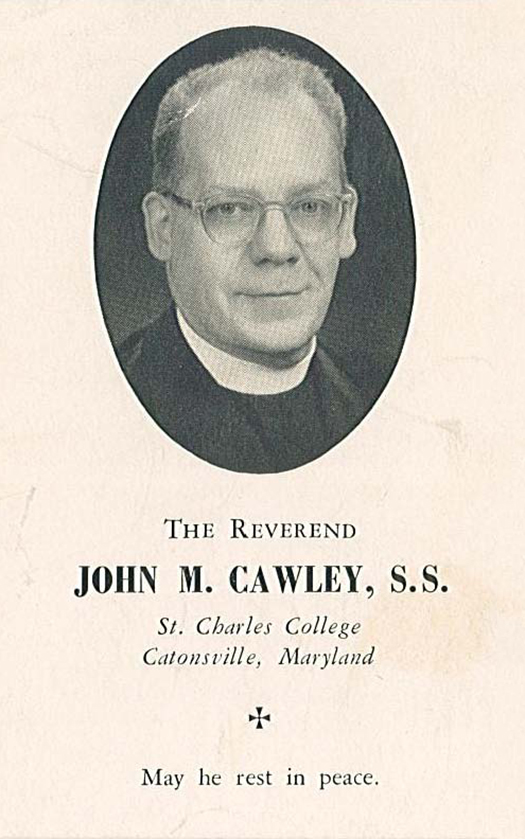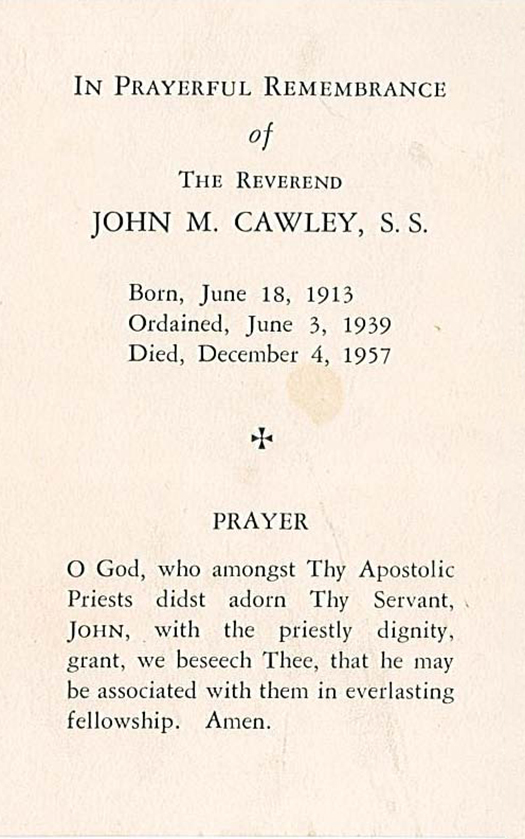Cawley, Father John
1957, December 4
Date of Birth: 1913, June 18
Paris
April 5, 1958
My dear Confreres:
Our minor seminary, St. Charles in Catonsville, in the environs of Baltimore, has just been tried anew in the person of Father John Cawley, whom God has judged worthy of receiving the reward of the elect, even though we were hoping that he would be able to give long service. He has gone to join Fathers Gleason, Saupin, and Whitford in the company of the saints, while we remain here, impoverished by his leaving.
John Cawley was born in the East of the United States, at Archbald, a little town in Pennsylvania, on June 18, 1913. He belonged to a deeply religious family who were to give to the Church two priests and a contemplative nun. He received his early education at the local elementary and high schools and finished his classical studies at St. Thomas College in Scranton. Having offered himself to his bishop as a priesthood candidate, Providence sent him to St. Mary’s, where he studied Philosophy in the old seminary on Paca Street and Theology in the new house at Roland Park. His stay in Baltimore made him value the work of clergy formation (to which our American confreres devote themselves exclusively) and he sought admission to the Society. Bishop Hafey of Scranton readily gave his permission. Three months after priestly ordination, in September 1939, he entered the Solitude, then quite close to St. Charles College. He thus involved himself with a house for the first time, a house with which he was henceforth to be intimately associated for his whole life. We must except a year which Father spent teaching at St. Joseph’s in Mountain View, the minor seminary of San Francisco. Also, another year which he spent at the Catholic University in Washington to take a degree in French.
As soon as Father Cawley was appointed to St. Charles in 1940, he immediately took an important part in the life of the community by reason of the numerous services he rendered in the college. His main teaching was always French, but seldom were the years when he did not have an English class. He also taught History, Christian Doctrine, Greek, or Latin. If we add that he was in charge of a dormitory for ten years, that each morning before Mass, he was available to the students for confessions, that he moderated the college magazine, The Borromean, we quickly realize that his time was pretty well taken up with classes, studies, and various jobs. In spite of all that, he managed to remain available for still more service.
Remarkably gifted, Father Cawley had a very wide acquaintance with the majority of the students, and not without reason. He seemed to be a living encyclopedia, perhaps the most fully informed of the teachers. There was no question to which he could not give an intelligent reply, not only in material more or less related to his teaching, but also in very different field stretching from the latest scientific discoveries to discussions on classical and modern music. A complete man, he had developed a great manual dexterity which allowed him to fix things with such ease that each morning, even before he returned from breakfast, a long queue of students lined up at the door of his room to ask him to repair this or that broken object.
These little details, which at first glance might seem insignificant, help us to understand the dominant trait in his makeup, that which won for him universal respect and affection – his charity.
He was, par excellence, the most charitable of men. An old saying has it that no one is a prophet in his own country. That can be translated by saying that no priest cuts a fine figure right before his confreres. Nevertheless, the case in hand is an exception.
Those who lived at St. Charles with Father Cawley, in unceasing and ever-growing admiration, are in agreement about his limitless kindness, kindness all the more remarkable in that he exercised it in strict community life, in a setting in which everything is experienced in a particularly acute manner. No one can remember a single instance when this priest let escape from his lips an uncharitable word. He was regarded as so good that any remark opposed to this virtue was avoided in his presence. If by chance he heard one, he took care to show no reaction, and he had the knack of soon changing the conversation without wounding anyone. He brought to mind Cardinal Newman’s definition of a gentleman: one who never purposely gives pain. On the contrary, with him the source of that attitude was not in external code of good breeding, but rather in a priest’s fundamental virtue, supernatural charity, as the Rite of Ordination tells us over and over.
If we were to sum up the facets of Father Cawley’s charity, we would call them: generosity, kindness, willingness to be of service. He was not satisfied to come quietly to the help of unfortunate students so as to spare them useless expense; beyond that, he wanted to be at everyone’s disposal. It was enough for him to have someone express the least wish, and he would involve himself in making that person happy without considering his own inconvenience on his own time.
It is unnecessary to add that thereby he showed a particular art in winning friendships, but friendships which avoided any semblance of exclusiveness. His charity went out to all and each in equal measure. It was of a kind to make him an ideal community man, always amiable, always smiling, never complaining. To match it he had, during his last years, more merit, as diabetes and heart trouble lessened his activity to the point where he was even obliged to give up participation in community life which meant so much to him.
With the students he kept in all circumstances a perfect fairness of outlook, seeking to understand them and – if possible – to excuse them. He often said of them, when a fault was committed, “When they grow up, they’ll understand.” He never became angry with them; never let himself take advantage of his position to humiliate them, for in them he saw future priests, his brothers in Jesus Christ. However, it is remarkable that his authority was not thereby lessened and that he never had to repeat a reprimand.
So to conclude on this life too short for our liking, ended at forty-four years, we shall say that Father Cawley will remain for us a model of what a Sulpician filled with the spirit of the Society ought to be, that is, one who forms in the souls of the young men, whom we have in charge, the virtues of Jesus Christ. We shall accomplish this work not so much by our words as by the example of our life, of the life of a heart capable, in the words of St. John, of expressing its love for God, Who is invisible, in an effective love of our neighbor who is at hand. In that vein, we can take Father Cawley as our model to whom those who were closer to him than I have not hesitated to apply these two verses from one of his favorite authors:
No one knew him without loving him,
No one named him without praising him.
On December 10th, in the St. Charles College chapel, the burial Mass was celebrated, and the mortal remains of our dear deceased were then borne to the little nearby cemetery, near the bodies of his old co-workers who welcomed him, we are sure, as he entered the House of the Lord.
Again, I ask you to pray for Father Cawley’s soul, and I express to you my paternally devoted sentiments in Our Lord and Our Lady.
Pierre Girard, S.S.
Superior General of the Society of St. Sulpice


